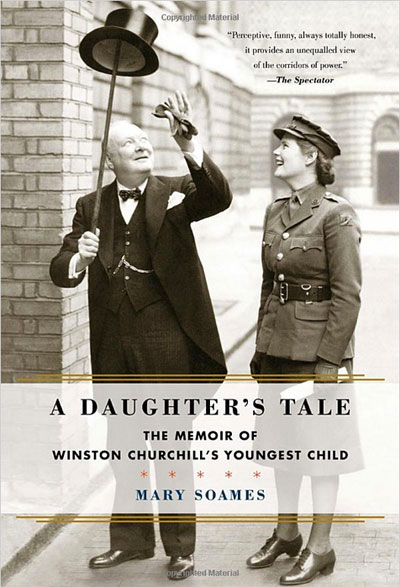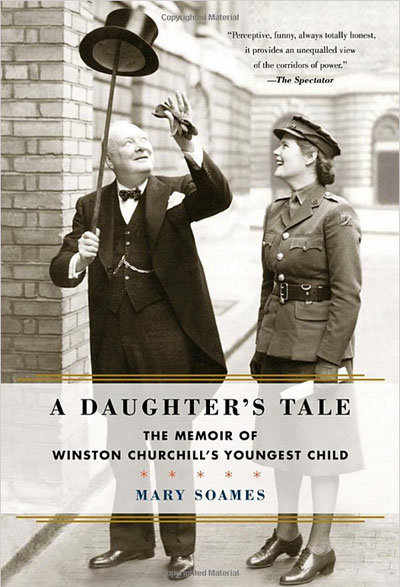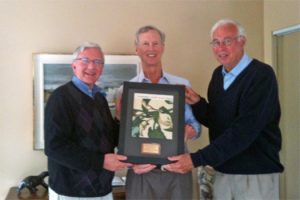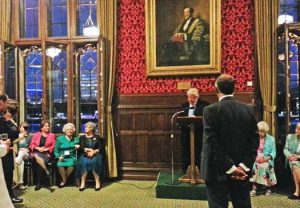
Bulletin #51 - Sep 2012
Lady Soames’ Memoir “A Daughter’s Tale” Just Published in the U.S.

September 12, 2012
New memoir of Churchill’s daughter now available at U.S. bookstores.
By Jonathan Yardley
 THE WASHINGTON POST, August 2012—These trips were successful, as “I started to get to know my mother — and, most important, to enjoy her company,” but “I sometimes found her difficult to understand and extremely demanding,” a problem made all the more difficult because Mary was in her teens “and must have been at times excessively tiresome, graceless, and, I fear, a dreadful prig.” Things were much easier with her father, who of course was insulated from the daily minutiae of his daughter’s life but seems to have been, in most respects, an exemplary father to all his children. During the 1930s she was largely oblivious to his involvement in the highest circles of government, but by 1940, when he was prime minister and the family was living at 10 Downing Street, that had changed. Her mother took her to the House of Commons to hear him speak after the evacuation of Dunkirk:
THE WASHINGTON POST, August 2012—These trips were successful, as “I started to get to know my mother — and, most important, to enjoy her company,” but “I sometimes found her difficult to understand and extremely demanding,” a problem made all the more difficult because Mary was in her teens “and must have been at times excessively tiresome, graceless, and, I fear, a dreadful prig.” Things were much easier with her father, who of course was insulated from the daily minutiae of his daughter’s life but seems to have been, in most respects, an exemplary father to all his children. During the 1930s she was largely oblivious to his involvement in the highest circles of government, but by 1940, when he was prime minister and the family was living at 10 Downing Street, that had changed. Her mother took her to the House of Commons to hear him speak after the evacuation of Dunkirk:
“It was now that my love and admiration for my father became enhanced by an increasing element of hero worship. I saw how people turned to him in confident hope; and my own daughterly affection became inextricably entwined with all the emotions I felt as a young, patriotic Englishwoman. And of course, it was enormously exciting being so near the hub of haute politique. My mother confided in me a good deal, and when I became aware that there was a real and growing fear that France might make a separate peace, having been brought up in an ardently Francophile family I was plunged into anguish, finding this prospect scarcely believable.”

2025 International Churchill Conference
In 1941 she and Judy Montagu, her cousin and best friend, were with her father when he was briefed on a plan for “the first heavy mixed (that is, employing both men and women) anti-aircraft batteries.” The women were to “perform all duties and technical operations (including radar) other than actually forming the gun teams, where the physical strength required to operate the 3.7-inch guns and to handle and load the shells was quite beyond the capacity of women.” The girls, still teenagers, “were much excited by all this, and intervened to say that we would both like to become ‘gunner girls’!”
They applied, passed the necessary tests, underwent training and soon enough were assigned to anti-aircraft batteries. The next step up was officers’ training, which they also passed — by war’s end Mary had risen to the rank of junior commander, the equivalent of captain — and were sent to separate batteries, much to their regret. Mary was assigned to a battery in Hyde Park, and though she “felt embarrassed by my ‘special treatment,’ ” her colleagues “were charming and most understanding,” because “they knew I had no part in these special postings which kept me in the London area: the powers-that-were had, I think, decided that my presence near to home would be a solace and pleasure to my father, and his needs featured large in people’s minds.”
If that was what the powers-that-were intended, they certainly were right, for his daughter’s company was indeed important to the prime minister. Over the remainder of the war she often served as his aide de camp on foreign trips, including meetings with Franklin Roosevelt, Harry Truman and Joseph Stalin. She seems to have acquitted herself well, notwithstanding her tender age, and the experience enables us to get an inside glimpse of these men and their highest-ranking associates as they plotted the course of war.
Unfortunately toward the end of the book she relies more than necessary on direct quotation from her rather flibberty-jibberty diaries, but youth does have its charms, and these extracts can be forgiven on that ground. On the whole “A Daughter’s Tale” is charming in the best sense of the word, a fit capstone to what has been a remarkable life.
You can contact Jonathan Yardley on [email protected]
Read the entire article at The Washington Post website
©The Washington Post. All rights reserved.
Subscribe
WANT MORE?
Get the Churchill Bulletin delivered to your inbox once a month.





